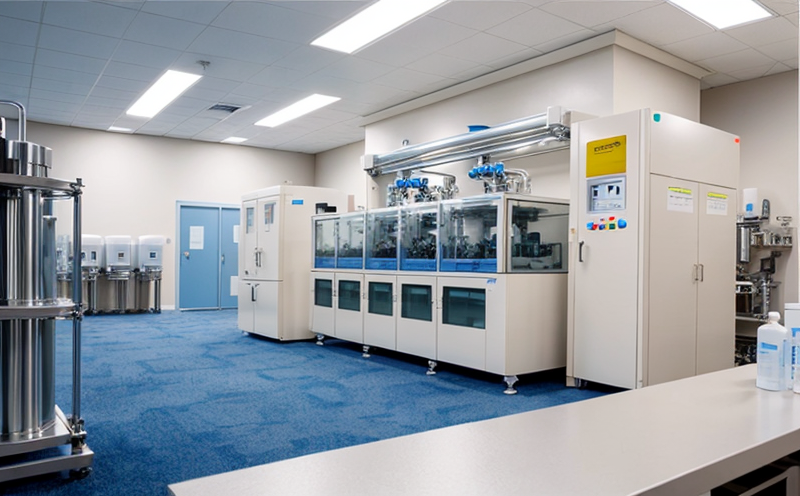
-
Pharmaceutical Compliance-
Pharmaceutical Biologics and Biosimilars Compliance-
Regulatory Compliance for Biologic Drug Products
We provide comprehensive solutions designed to help our clients mitigate risks, enhance performance, and excel in key areas such as quality, health & safety, environmental sustainability, and social responsibility.
Discover
For many years, our organization has been operating successfully, boasting modern laboratories that meet international standards. These laboratories are equipped with the latest technology devices and equipment, and we have built a strong team of experienced and trained personnel to operate them.
DiscoverWelcome to Eurolab, your partner in pioneering solutions that encompass every facet of life. We are committed to delivering comprehensive Assurance, Testing, Inspection, and Certification services, empowering our global clientele with the ultimate confidence in their products and processes.
Discover
-
Pharmaceutical Compliance-
Pharmaceutical Biologics and Biosimilars Compliance-
Regulatory Compliance for Biologic Drug ProductsRegulatory Compliance for Biologic Drug Products: Ensuring Safety and Efficacy
The biotechnology industry has experienced significant growth in recent years, driven by advances in genetic engineering, cell culture technology, and recombinant DNA methods. This growth has led to the development of innovative biologic drugs that have improved patient outcomes and transformed treatment options for various diseases. However, with this progress comes the need for rigorous regulatory oversight to ensure the safety, efficacy, and quality of these products.
Regulatory compliance is a critical aspect of biologics development, manufacturing, and distribution. The complex nature of biologic drugs requires adherence to strict regulations to prevent contamination, ensure consistent product performance, and maintain patient safety. In this article, we will discuss the regulatory framework for biologic drug products, highlight key requirements, and provide detailed explanations of critical aspects.
Key Regulatory Agencies
Several regulatory agencies play a crucial role in overseeing the development, manufacturing, and distribution of biologic drugs. These include:
Biologic drugs are complex molecules derived from living cells or organisms. Examples include insulin, growth hormone, and monoclonal antibodies.
2. What is GMP in the context of biologics development?
Good Manufacturing Practice (GMP) refers to a set of guidelines that ensures manufacturing processes meet quality standards for the production of biologic drugs.
3. What is PQS?
Pharmaceutical Quality System (PQS) establishes quality management principles for pharmaceutical products, including biologics.
4. Why are clinical trials required for biologic drugs?
Clinical trials demonstrate safety and efficacy by comparing a new biologic to existing treatments or placebo controls.
5. What is the role of ICH in regulatory compliance for biologics?
The International Council for Harmonisation (ICH) develops guidelines for pharmaceutical product development, including biologics, to ensure global harmonization.
Conclusion
Regulatory compliance is a critical aspect of biologics development, manufacturing, and distribution. Adherence to strict regulations ensures the safety, efficacy, and quality of these products, ultimately benefiting patients worldwide. By understanding key regulatory agencies, requirements, and guidelines, companies can navigate the complex regulatory landscape and bring innovative biologic drugs to market.
References

Food Safety and Testing
Food Safety and Testing: Ensuring the Quality of Our Food As consumers, we expect our food to be sa...

Renewable Energy Testing and Standards
Renewable Energy Testing and Standards: Ensuring a Sustainable Future The world is rapidly transiti...

Battery Testing and Safety
Battery Testing and Safety: A Comprehensive Guide As technology continues to advance, battery-power...

Automotive Compliance and Certification
Automotive Compliance and Certification: Ensuring Safety and Efficiency The automotive industry is ...

Military Equipment Standards
Military Equipment Standards: Ensuring Effectiveness and Safety The use of military equipment is a ...

Environmental Impact Assessment
Environmental Impact Assessment: A Comprehensive Guide Environmental Impact Assessment (EIA) is a c...

Agricultural Equipment Certification
Agricultural equipment certification is a process that ensures agricultural machinery meets specific...

IT and Data Center Certification
IT and Data Center Certification: Understanding the Importance and Benefits The field of Informatio...

MDR Testing and Compliance
MDR Testing and Compliance: A Comprehensive Guide The Medical Device Regulation (MDR) is a comprehe...

Transportation and Logistics Certification
Transportation and Logistics Certification: A Comprehensive Guide The transportation and logistics ...

Pressure Vessels and Installations Testing
Pressure Vessels and Installations Testing Pressure vessels are a critical component of various ind...

Railway Industry Compliance
Railway Industry Compliance: Ensuring Safety and Efficiency The railway industry is a critical comp...

Consumer Product Safety
Consumer Product Safety: Protecting Consumers from Harmful Products As a consumer, you have the rig...

Construction and Engineering Compliance
Construction and Engineering Compliance: Ensuring Safety, Quality, and Regulatory Adherence In the ...

Healthcare and Medical Devices
The Evolution of Healthcare and Medical Devices: Trends, Innovations, and Challenges The healthcare...

Trade and Government Regulations
Trade and government regulations play a vital role in shaping the global economy. These regulations ...

Electromechanical Safety Certification
Electromechanical Safety Certification: Ensuring Compliance and Protecting Lives In todays intercon...

Electrical and Electromagnetic Testing
Electrical and Electromagnetic Testing: A Comprehensive Guide Introduction Electrical and electrom...

Lighting and Optical Device Testing
Lighting and Optical Device Testing: Ensuring Performance and Safety Lighting and optical devices a...

Aviation and Aerospace Testing
Aviation and Aerospace Testing: Ensuring Safety and Efficiency The aviation and aerospace industr...

Industrial Equipment Certification
Industrial equipment certification is a critical process that ensures industrial equipment meets spe...

Cosmetic Product Testing
The Complex World of Cosmetic Product Testing The cosmetics industry is a multi-billion-dollar ma...

Product and Retail Standards
Product and Retail Standards: Ensuring Quality and Safety for Consumers In todays competitive marke...

NEBS and Telecommunication Standards
Network Equipment Building System (NEBS) and Telecommunication Standards The Network Equipment Bu...

Environmental Simulation Testing
Environmental Simulation Testing: A Comprehensive Guide In todays world, where technology is rapidl...

Chemical Safety and Certification
Chemical safety and certification are critical in ensuring the safe management of products and proce...

Fire Safety and Prevention Standards
Fire Safety and Prevention Standards: Protecting Lives and Property Fire safety and prevention stan...

Energy and Sustainability Standards
In today’s rapidly evolving world, businesses face increasing pressure to meet global energy a...

Pharmaceutical Compliance
Pharmaceutical compliance refers to the adherence of pharmaceutical companies and organizations to l...

Hospitality and Tourism Certification
Hospitality and Tourism Certification: Unlocking Opportunities in the Industry The hospitality and ...